
Cubalex, Julio Ferrer Esq., 2 September 2021 — “The assembly is not in session, during which time governance is by decree, and the approval of laws in the legislative schedule is still pending. To this we add that the president affirms that the country’s institutional framework is being strengthened and reinforced.”
It is necessary to ask Homero Acosta, Secretary of the Council of State, how is it possible that the Municipal Assembly of Central Habana can meet, yet the National Assembly, the highest legislative body in the country, cannot?
Could it be that Covid-19 only represents a danger for national deputies? Is it not convenient for the Cuban government that the highest legislative body should meet? If it did, it would have no option but to comply with the Legislative Schedule and approve the much-announced and long-awaited laws such as that of the claim, before the courts, for violation of constitutional rights, and of Criminal Procedure, and of the one that should implement the right to peaceful demonstration and protest.
The legislative inactivity of the National Assembly allows the authorities to continue enjoying the state of impunity that they have always enjoyed, especially after July 11, 2021. They continue to apply obsolete legal provisions untempered by continue reading
In my opinion, believe me I wish I were wrong, the Constitution will continue to be disrespected in Cuba by the very authorities who are responsible for asserting the superiority of that Magna Carta. Cuba continues to be governed by decrees, resolutions, agreements, etc., in a manner less democratic, less inclusive, and less participatory for ordinary citizens. Their opinions are not taken into account in the drafting and editing of these decrees and other normative provisions, issued without being prepared in the Legislative Schedule.
And so the President asserts that in this way the country’s institutionality and the “Socialist State of Law” are strengthened and reinforced. This term, which according to him was embodied in the new Constitution, still waits to be defined or conceptualized: at this point we do not know what the “Socialist State of Law” is.
Translated by Tomás A.
